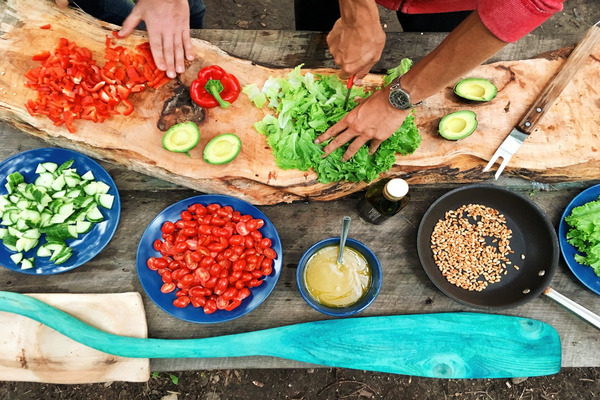

5 Foods That Reduce High Cholesterol

Cholesterol is a type of fat, it is a double-edged sword. Certain types of cholesterol are necessary to maintain bodily functions but other types such as LDL (Low-Density Lipoprotein) cholesterol are potentially harmful in high concentrations. Cholesterol is naturally produced by your body, it is carried by lipoproteins in the blood. HDL (High-Density Lipoprotein) cholesterol is good for you but LDL is harmful as it gets clumped along the walls of your blood vessels leading to a range of cardiac diseases such as atherosclerosis. M. Wesley Milks, MD recounts how he reduced his high LDL-cholesterol levels by shifting to a plant and lentil-based diet accompanied by fish oil supplements and light exercise. High cholesterol levels in your blood can be detected only through testing, there are no outer symptoms. Read on to learn more about the kind of foods and superfoods that help in reducing cholesterol on a long-term basis. It is important to note that you must have a healthy mix of all these foods while designing your diet. A combination of these foods along with moderate exercise is essential for maintaining a healthy heart and low cholesterol.
1. Nuts
Nuts contain a lot of healthy fats and fiber. You must eat a variety of nuts to get the nutrient from unsaturated healthy fats. Nuts do not contain saturated fats, thus keeping the cholesterol in check and the fibers in nuts stop any cholesterol from getting absorbed in the blood. Choose nuts that are least processed, unsalted and unroasted. Try to eat nuts with the skin on, this ensures maximum nutrient consumption. A handful (28-30g) of nuts such as almonds, macadamia, brazil nuts, pistachios, hazelnuts, walnuts, pecans, peanuts, etc. can be consumed on a daily basis. In addition, nuts are quite filling and can be used as a replacement for unhealthy snacks. It is advised to be careful as some people might have serious nut allergies and you need to understand which nuts you can tolerate.
2. Fatty Fish and Foods Rich in Heart-healthy Fats
Fatty fishes such as salmon, mackerel, sardines, pilchards, herring, sardines, etc. contain omega-3-fatty acids which help reduce LDL-cholesterol and triglycerides in the bloodstream and also help in protecting the heart by preventing the occurrence of atypical heart rhythms. Eating oily fish at least twice or thrice a week is good for the health. Even though fresh fish is highly recommended, canned or preserved fish also serve the purpose. Avocado and olives also contain heart-healthy poly and mono-unsaturated fats. Avoid coconut oil, palm oil, butter, cream, etc. as they contain saturated fats which increase LDL levels.
3. Oats and Barley (Wholegrains)
Oats and Barley are soluble fibres. These whole grains are rich in beta-glucan which helps lower LDL-cholesterol. Beta-glucan binds with bile acids in cholesterol in the intestine which helps in making sure that less cholesterol goes into your blood. Oats can be consumed in the form of porridge, cereal, biscuits, as well as added into soups, stews, and smoothies. Eat at least three servings of oats and barley. Do not eat flavored instant oats as they contain a lot of salt and preservatives which might hike the blood pressure. Avoid highly processed and packed carbohydrates.
4. Vegetables, Fruits and Legumes
Every healthy diet includes fresh fruits, vegetables, and legumes as they contain a lot of soluble fiber, vitamins, and minerals. Take four to five servings of vegetables every day and consume fruits instead of desserts. They reduce and obstruct the absorption of cholesterol and contain negligible amounts of fats and calories thus you can consume a greater amount without fear of calorie gain. Leafy green vegetables such as spinach and kale contain potassium and other nutrients which help in the maintenance of heart health. Legumes and lentils such as green peas, garbanzo beans, kidney beans, black-eyed peas, chickpeas, red lentils, etc. provide plant-based protein and fiber. These are very versatile and can be included in every meal. They can be made into soups, dips, curries, salads, etc. Also, lentils and beans take a while to digest, preventing you from unnecessary snacking.
5. Stanols and Sterol Supplements
Stanols and sterols are phytochemicals (chemicals found in plants) that block cholesterol from being absorbed in the blood as their molecules are similar in nature to cholesterol and are absorbed in its place. The amount of sterols acquired from vegetable oils and greens are not enough in concentration. Hence, it is better to consume foods loaded with extracted sterols and stanols. These fortified foods help in reducing cholesterol gradually and work wonders for patients with high cholesterol and those who have a family history of cholesterol. Avoid these foods if you are pregnant or breastfeeding.

















